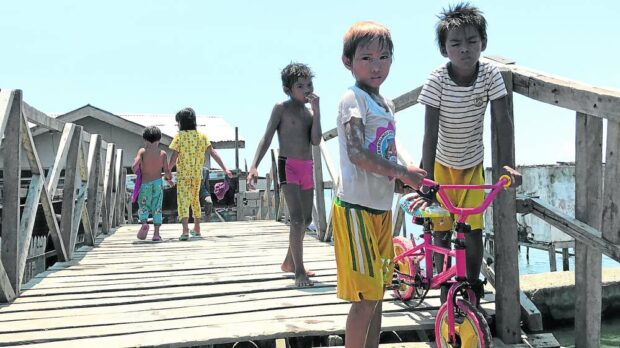Zamboanga City’s curfew law for kids worries CHR

NO MORE NIGHTTIME OUTINGS | These Badjao children in this undated photo, who usually go fishing at night, will be among those who will be affected once Ordinance No. 636, Zamboanga City’s curfew directive regarding minors, takes effect this month. (Photo by JULIE ALIPALA / Inquirer Mindanao)
ZAMBOANGA CITY, Zamboanga Del Sur, Philippines — As this city started preparing to implement this month its ordinance imposing a 10 p.m. to 4 a.m. curfew on minors, the Commission on Human Rights (CHR) urged local officials to observe the provisions of the Juvenile Justice and Welfare Act to ensure safe handling of children at risk of being turned offenders by the local measure.
While the CHR supports the intention of the ordinance, which is to protect minors, it maintained that imposing penalties on children for violating the curfew may be considered a “status offense,” which is prohibited by the Convention on the Rights of the Child (CRC), said lawyer Judelyn Macapili, the director of the CHR in Zamboanga Peninsula (Region 9). Under the Juvenile Justice and Welfare Act of 2006, offenses that apply only to minors are called “status offenses” that have no accompanying penalty. The examples of these offenses include curfew violations and truancy.
The Philippine Senate explained the act was a “result of the state’s recognition of the child’s right to be treated in a manner consistent with the promotion of the child’s sense of dignity and worth, taking into account the child’s age and desirability of promoting his/her reintegration.”
‘For their protection’
In December last year, the Zamboanga City Council passed Ordinance No. 636 imposing a city-wide curfew for children, following the Dec. 3 bombing that killed four people and wounded at least 50 others during a Mass inside the Mohamman Ali Dimaporo gymnasium of the Mindanao State University in Marawi City.
Lawyer Kenneth Vincent Beldua, secretary of the city council, said the ordinance enacted on Dec. 18 and signed by Mayor John Dalipe on Dec. 27, will be implemented anytime after its publication in local papers.
Beldua said the ordinance covered “children and minors below the age of 18, or those already past that age but are still unable to fully take care of themselves, nor protect themselves from abuse, neglect, cruelty, exploitation or discrimination because of a physical or mental disability or condition.”
He said the curfew would be imposed for their protection. It would cover children playing, loitering, or roaming the streets, or those who were merely hanging out or staying outside their homes or in any other public places from 10 p.m. to 4 a.m. in the city.
“It shall be unlawful for a parent or guardian of a child to knowingly permit their child to play, loiter or roam the streets, or hang out outside their dwellings or in any public places,” Beldua said. “They (the adults) will be meted with penalties,” he added.
Under the ordinance, all violators will be fined with P500 and two hours of community service for the first offense; P1,000 and three hours of community service for the second offense; and P3,000 with five hours of community service for the third offense.
Sought by the Inquirer for comment, Macapili said the CHR supported the intention and purposes of City Ordinance No. 636. “(But) we must maintain that imposing penalties for violating the curfew imposed on children may be considered a status offense, which the Convention on the Rights of the Child prohibits. The Committee on the Rights of the Child urges state parties to the convention to abolish status offenses to uphold equal treatment under the law for children and adults.”
She added: “The Commission opines that the provision of Republic Act No. 9344 of the Juvenile Justice and Welfare Act should be observed in handling children at risk, particularly in the implementation of the City Ordinance No. 636.”
“We reiterate our support, but in the process of ensuring protection to children at risk, the government must ensure a holistic intervention program for the children and their families,” she further said.
‘Find other ways’
Among those who will be directly affected by the ordinance is Boboy (not his real name), 17, who will no longer be able to work selling balut at night to help his family.
His mother Josefina juggled her time as a laundrywoman and a market vendor to support him and five other siblings. “(The curfew) will reduce our income and our capacity to buy food,” he said.
He said he hoped the local government would look for other ways to secure minors on the streets.
“I dropped out of school four years ago when my father died in an accident [on] the construction site where he worked. My mother relies on me for added income,” he said.
Kin Gerald Lugas, a senior political science student of Western Mindanao State University (WMSU) here, welcomed the curfew for minors but with some reservations.
“The intent of (such an ordinance) is for our safety,” said Lugas, a resident of Zamboanga Sibugay and vice president of the university’s student council. “We respect that. With the Marawi incident, it’s imperative that we have to implement this curfew,” he said. He added that sometime this month, they would conduct symposiums and forums to keep students informed of the provisions of the ordinance imposing curfew on minors. WMSU has more than 32,000 students.
But he felt bad when he learned about minors like Boboy, who had to struggle to secure the necessary working permit and had to work hard to support their families.